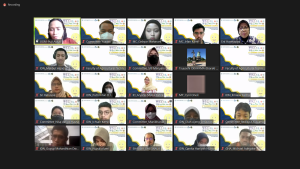
The Faculty of Agricultural Technology UGM held a Summer Course for the 4th time. This event lasted six days, from August 8th to August 13th, 2022. The theme is “Smart Technology in Agroindustrial Sector: Concept and Implementation (On-farming, post harvesting, food processing, food handling, system engineering, agroindustrial management and information systems)“. This year’s Summer Course will be held online using a synchronous approach through Zoom and asynchronous media using UGM’s E-Learning system (E-LOK). The grand opening took place on August 8, 2022. The opening ceremony featured remarks from the Committee’s Chair, Makbul Hajad, S.T.P., M.Eng., Ph.D., the Dean of FTP UGM, Prof. Dr. Ir. Eni Harmayani, M.Sc., and Dr. Puji Astuti, S.Si., M.Sc., Apt. as the UGM International Affairs Office, Universitas Gadjah Mada.

There were 20 speakers in this Summer Course (13 international speakers and 7 home speakers). The following foreign speakers have been invited: Prof. Yu Pin Lin (National Taiwan University), Xiongzhe Han, Ph.D (Kangwon National University), Prof. Takashi Okayasu, Ph.D (Kyushu University), Asst. Prof. Ravipim Chaveesuk (Kasetsart University), Prof. Tsuyoshi Okayama (Ibaraki University College of Agriculture ), Dr. Nathdanai Harnkarnsujarit (Kasetsart University), Prof. Hitoshi Shirakawa (Tohoku University), Dr. Shivani Pathania. (Agriculture and Food Development Authority, Ireland), Prof. Miguel Palma (Universidad de Cádiz, Spain), Asst. Prof. Thanit Puthpongsiriporn, Ph.D (Kasetsart University), Assoc. Prof. Sastia Prama Putri (Osaka University), Prof. Christine Hung (Ghent University), Prof. Shabbir H. Gheewala (King Mongkut’s University of Technology Thonburi, Thailand). Meanwhile, the domestic speakers who were invited were: Prof. Lilik Sutiarso (UGM), Andri Prima Nugroho, S.T.P., M.Sc., Ph.D (UGM), Bayu Dwi Apri Nugroho, S.T.P., M.Agr., Ph.D. (UGM), Dr. Widiastuti Setyaningsih, S.T.P., M.Sc. (UGM), Prof. Dr. Ir. Endang Sutriswati Rahayu, M.S. (UGM), Dr. Atris Suyantohadi, S.T.P., MT. (UGM), Henri Suharja (Startup Retail Titip.ku).
There are 93 registered participants (40 overseas participants and 53 domestic participants). Professionals and students from Indonesia, Poland, Sudan, Thailand, Japan, Mexico, Malaysia, the Philippines, Ghana, China, South Korea, Sri Lanka, Laos, Nepal, Cambodia, India, and the Netherlands were among those that took part. In addition to expert presentations and group discussions, participants took part in virtual field trips and community visits to several places in Indonesia.
The first day was also filled with a material presentation from Prof. Yu Pin Lin, Prof. Lilik Sutiarso, and Mr Bayu Dwi Apri Nugroho, PhD, divided into three sessions. Prof. Yu Pin Lin with the topic “Integration of Corp and Water Resources Thinking in Adaptation to Impact of Climate Change“. Prof. Yu Pin Lin described how global warming promotes climatic change, which in turn affects agricultural ecosystems. Some of the implications include the disappearance of the lowest temperature limit for crop development, the shortening of crop growing time, changes in the optimal crop growth threshold (critical point), higher water needs for crop growth, and an increase in the occurrence of pests and diseases.
The second session by Prof. Lilik Sutiarso with the topic “Introduction to Smart Farming in Indonesia”. He defined smart farming as information and knowledge management (data driven), precision agriculture, automation, and agricultural robotics. Government policy and regulation, learning organization-based institutions, agricultural machinery industry, humanity agricultural technology, qualified people resource, and supporting infrastructure will all be involved in the integration of smart agriculture in Indonesia. To implement smart agriculture, it is necessary to first understand the farmer’s situation so that the appropriate technology may be adopted by the farmer. Because Indonesia is seen to be developing smart agriculture, improvements along the value chain are critical.
The last session was delivered by Mr Bayu Dwi Apri Nugroho, PhD, with the topic “Agri-Tech and Agribusiness Integration as Innovation to Support the Agricultural Ecosystem in Indonesia“. He explained how smart farming may be used to boost fertilization productivity and efficiency, as well as production and production costs. If agricultural technology is utilized in an agricultural ecosystem, incorporating food availability and security with the notion of traceability, it will be more beneficial in solving challenges from land to table. Finally, Mr. Bayu stated that the success of an agricultural ecosystem using technology is dependent on the dedication of each player in the ecosystem.
